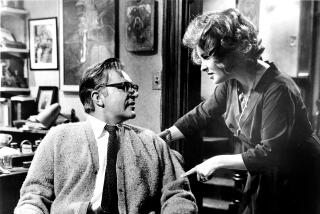‘First Love’ is austere but wins you over
A young man in a hoodie and sneakers steps into a square of light and speaks: “I associate, rightly or wrongly, my marriage with the death of my father. . . . That other links exist, on other planes, between these two affairs, is not impossible.”
No, this isn’t the new season of “In Treatment” but the West Coast premiere of “First Love,” a monologue by Samuel Beckett staged by Ireland’s Gare St Lazare Players. There’s no Gabriel Bryne but plenty of Celtic angst, which is to say this is a romantic comedy. As the playwright himself said, “Nothing is funnier than unhappiness.”
This rarely seen work is part of the new Rubicon International Theatre Festival in Ventura, a showcase of innovative works from France, Israel, Africa and Britain. Beckett wrote the story as a novella in 1946 but didn’t publish it until 1970.
We give birth astride a grave, but it seems we date there as well. After his father dies, the young man (Conor Lovett) is ejected from their home and takes refuge on a bench. At some point, a woman sits down next to him. He resents her intrusion and promptly falls in love.
As the monologue progresses, the man struggles to make sense of his feelings and his body, ever at odds. Erections betray. Women’s bodies appall. He deems love a “banishment,” an exile from literal dwellings and the comfort of the known self. Fathers, lovers, babies -- connection is both an uncontrollable urge and an agony. Hell is other people. Then again, they do give you good material.
Lovett slips on Beckett’s droll misanthropy like a well-worn overcoat. With his bald pate, big ears and long face, he’s a mix of George Carlin, Wallace (Gromit’s human) and a dash of Nosferatu, a creature sniffing out human feeling as if it’s a toxic fungus. By turns witty and bewildered, Lovett is utterly at ease with the text, its dirty jokes, dead ends, emotional precipices. Under Judy Hegarty Lovett’s disciplined direction, this renowned Beckett interpreter performs without pretension or indulgence.
Under all the mythology, “First Love” asks, is love anything more than self-interest? Animal comfort? A way to bear the absence of a parent? What is its irreducible element?
Let’s be honest, though, a Beckett play can feel like a form of cruel math. One wonders if the evening offers a sufficient epiphany to offset its extreme austerity.
Well, yes and no. Beckett is one of the least transactional artists of all time. Like Miles Davis, he could care less if you’re listening, and it’s his indifference that wins your trust.
More to Read
The biggest entertainment stories
Get our big stories about Hollywood, film, television, music, arts, culture and more right in your inbox as soon as they publish.
You may occasionally receive promotional content from the Los Angeles Times.






